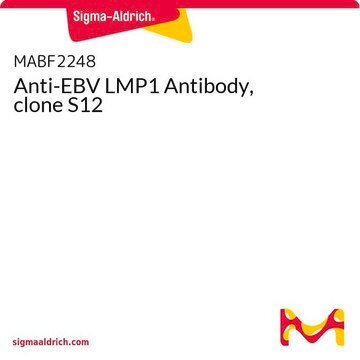MAB10219
Anti-Epstein Barr Virus Antibody, clone 72A1 | MAB10219
ascites fluid, clone 72A1, Chemicon®
Sign Into View Organizational & Contract Pricing
All Photos(1)
About This Item
UNSPSC Code:
12352203
eCl@ss:
32160702
NACRES:
NA.41
Recommended Products
biological source
mouse
Quality Level
antibody form
ascites fluid
antibody product type
primary antibodies
clone
72A1, monoclonal
species reactivity
human
manufacturer/tradename
Chemicon®
technique(s)
immunofluorescence: suitable
isotype
IgG1
shipped in
dry ice
General description
Epstein-Barr virus, frequently referred to as EBV, is a member of the herpesvirus family and one of the most common human viruses. Although the symptoms of infectious mononucleosis usually resolve in 1 or 2 months, EBV remains dormant or latent in a few cells in the throat and blood for the rest of the person′s life. Periodically, the virus can reactivate and is commonly found in the saliva of infected persons. This reactivation usually occurs without symptoms of illness. EBV also establishes a lifelong dormant infection in some cells of the body′s immune system.
Specificity
The antibody reacts with the 350kDa/220kDa dalton viral envelope glycoprotein.
Immunogen
Disrupted fixed Epstein-Barr virus particles
Application
Research Category
Infectious Diseases
Infectious Diseases
Research Sub Category
Infectious Diseases - Viral
Infectious Diseases - Viral
Physical form
Ascites
Liquid ascites fluid containing no preservatives.
Storage and Stability
1 year at -20°C from date of shipment
Legal Information
CHEMICON is a registered trademark of Merck KGaA, Darmstadt, Germany
Disclaimer
Unless otherwise stated in our catalog or other company documentation accompanying the product(s), our products are intended for research use only and are not to be used for any other purpose, which includes but is not limited to, unauthorized commercial uses, in vitro diagnostic uses, ex vivo or in vivo therapeutic uses or any type of consumption or application to humans or animals.
Not finding the right product?
Try our Product Selector Tool.
Storage Class
10 - Combustible liquids
wgk_germany
WGK 1
flash_point_f
Not applicable
flash_point_c
Not applicable
Certificates of Analysis (COA)
Search for Certificates of Analysis (COA) by entering the products Lot/Batch Number. Lot and Batch Numbers can be found on a product’s label following the words ‘Lot’ or ‘Batch’.
Already Own This Product?
Find documentation for the products that you have recently purchased in the Document Library.
Monoclonal antibody against a 250,000-dalton glycoprotein of Epstein-Barr virus identifies a membrane antigen and a neutralizing antigen
Hoffman, G J, et al
Proceedings of the National Academy of Sciences of the USA, 77, 2979-2983 (1980)
María López-Montañés et al.
Journal of immunology (Baltimore, Md. : 1950), 199(2), 656-665 (2017-06-21)
NK cells have been reported to respond against EBV-infected B cells in the lytic cycle and to control the viral infection involving IFN-γ secretion. Early reports proposed a role for NK cell Ab-dependent cellular cytotoxicity (ADCC) triggered via FcγR-IIIA (CD16)
Keiko Nagata et al.
Viral immunology, 31(8), 540-547 (2018-09-18)
Immunoglobulin (Ig) G4-related disease (IgG4-RD) is a newly recognized systemic fibroinflammatory disease with characteristic histological findings and high serum IgG4 levels. Epstein-Barr virus (EBV) is a persistent herpesvirus in B lymphocytes, and we previously reported EBV reactivation-induced Ig production. We
Chien-Hui Hung et al.
Journal of virology, 88(20), 12133-12145 (2014-08-15)
Autophagy is an intracellular degradation pathway that provides a host defense mechanism against intracellular pathogens. However, many viruses exploit this mechanism to promote their replication. This study shows that lytic induction of Epstein-Barr virus (EBV) increases the membrane-bound form of
Keiko Nagata et al.
Autoimmunity, 48(5), 328-335 (2015-03-12)
Epstein-Barr virus (EBV) is a ubiquitous virus that infects most adults latently. It persists in B lymphocytes and reactivates occasionally. Graves' disease is an autoimmune hyperthyroidism caused by thyrotropin receptor antibodies (TRAbs). We have reported that Graves' disease patients and
Our team of scientists has experience in all areas of research including Life Science, Material Science, Chemical Synthesis, Chromatography, Analytical and many others.
Contact Technical Service






